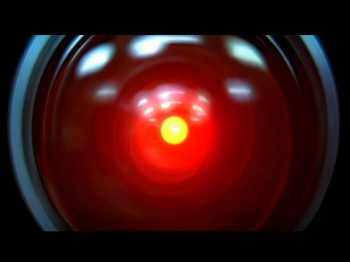R&D to SF: Thanks for ruining it for the rest of us!

Although it first filed paperwork in mid April of this year, the news that Samsung was suing Apple (the iPhone guys, not the Beatles label) was rendered strange by one of their arguments. It seems that Samsung was contesting the viability of Apple’s patents for the iPhone and iPad, because a nearly identical device had been seen used on the U.S. space mission Discovery One, way back in 1968.
Yes, that Discovery One. You know, the mission to Jupiter where the HAL-9000 AI had a series of unforeseen technical difficulties and eliminated the human crew, thus putting the U.S. space program on hold until mid 1969, when America renounced its Jovian ambitions and settled for landing on the moon.
Samsung used, in its initial defense of the argument, this clip from a documentary on Discovery One, clearly showing members of the ill-fated crew using an iPad-a-like to stream video feeds while somewhere past Mars orbit. This, Samsung assured the press and the courts, is clear evidence that Apple didn’t invent anything, and that the idea –the actual execution, even– of the iPad had been around long before Apple even existed. So, all of Apple’s patents had to be seen for the shams that they were. Steve Jobs was, in effect, cribbing ideas from doomed U.S. space missions, and profiting from the misfortunes of historical figures.
The defendants then asked the plaintiffs, “Are you kidding me?” It was then pointed out that the Discovery One was a fictional mission, and that the technology seen in the footage provided was a visual effect in the film 2001: A Space Odyssey. The suit, however, is going ahead, to start wending its way through the courts at some point in the future.
That a real company can sue another real company over patents held by unnamed fictional corporate entities is a strange turn of events. Samsung simply asserts that 2001: A Space Odyssey shows that an idea was already in existence, and is claiming this should somehow impact Apple’s patents. Had this been put into a speculative fiction piece, it would have been rejected as entirely implausible. On its face, a rejection slip might read, this is a really dumb idea, since it opens floodgates of consequence that are so obvious, no society would even consider the argument seriously.
There’s a saying the Illiad, about truth being strange than fiction. Or was it Ben Franklin who said that? The point is, Samsung has successfully crossed that tenuous border, dragging the real world into a place where it was not meant to go.
If Samsung’s argument is given any traction, it threatens the intellectual rights of every patent holder who ever developed anything that has appeared in any form in any speculative work of fiction. Considering the trove of science fiction mined in the twentieth century alone, this means pretty much every tech patent out there.
Aurthur C. Clarke, fresh off a Guiness-fueled writing binge somewhere in the Elysian Fields, can reap a windfall from aerospace companies for his successful prediction of weather satellites. Jules Verne will be happy for the living members of his estate, as they will be the beneficiaries of all military contracts involving submarines, although he may have to go halvesies with DaVinci. Of course, nearly everyone has to give some small slice to DaVinci, whose descendants will have to be tracked down to be showered with a couple of centuries of technology-based profits. Gene Roddenberry will get a retroactive large slice of all flip-phone profits, and his estate can probably argue that the United Nations is based around the Federation. Sure, the Federation came after the UN, but with the proper legal jujitsu, time-transitive lawsuits can become a reality, too.

Sound ridiculous? Of course! But that’s the point: the ridiculous barrier has been broken, and how can we reclaim our innocence? From here, it’s just a matter of time until this dense vein of moronic reasoning gets its first prospectors rich, and then it’ll be a stupidity-rush. Everyone will want a piece of the implausible, even if the entire mountaintop of common sense needs to be removed, and dumped into the valleys where only illogical streams of thought once gathered.
So, welcome to the future! Tech companies can now stop developing those medical breakthroughs, since those will be too close to something depicted by a special effects team somewhere. What, going to release the iHeal rejuvenation tank this fall? Don’t bother, the bacta tank beat you to it! Prosthetic limbs? I’m sure William Gibson and Walter John Williams would love to see lifelike cyber-parts. Oh, and expect all computers to stop getting faster or better, since advances like that are impossible to profit from. Lot of straws drinking from that milkshake!
So, thanks, Samsung, for making science fiction the tool that dismantles technological progress! Oh, and the rights to the coming apocalypse are already being optioned, too, depending on what form the collapse of society ends up taking.
Well, maybe this can be fanned to be the “Final Straw” on the public’s tolerance of copyright abuse. Long term copyrights rarely if ever benefit the author, or heirs, just the money parasites. The current wifi/touch screen revolution is being hamstrung by “Patent Trolls” of which this seems fallout, parasites who produce nothing but hold the works of others not just to extort the use but to often hinder advance, protecting markets for them or others. It is the opposite of what was intended when copyright was made. A world where no one CAN innovate/invent is as bad or worse than one where no one will, and due to unpunished theft or blackmail by pretense it’s the same.
I thought Apple was the one doing the suing…
From what I’ve read online, Apple filed a preliminary injuction against US sales of several Samsung products for infringing three of Apple’s design patents and one technology patent used on the iPhone and iPad. Samsung is responding that Apple doesn’t really have a right to the design patents as they include previously-used elements. Cue the 2001 clip! According to AppleInsider.com, this kind of defense has actually worked before: a waterbed patent was denied in the 1960s because Heinlein had written about them in the 1930s.
We’ll have to wait and see what happens…
http://www.appleinsider.com/articles/11/08/23/samsung_cites_science_fiction_as_prior_art_in_us_ipad_patent_case.html
If Apple can’t beat this lawsuit, what could it mean for. . . well, ANY industry?
In this particular case, Apple is the one being ridiculous and not Samsung.
Apple are claiming to have “invented” the idea of a flat, rectangular screen.
Samsung, have merely pointed out that Apple couldn’t have “invented” an idea so obvious, that even in the 60s, it was posited on a popular movie.
Current patent law is costing companies a fortune that ought to be spent instead on research. They patent every stupid little thing for fear that if they don’t, some other company will and they will have to pay a tax for using it.
It needs to stop.
Actually, I re-read the original articles on this from April, and was reminded that Apple is indeed the plaintiff (my bad!). I’d forgotten that, seeing how Apple was suspected of doing some pretty shady things in the course of this suit. But the larger point of how legal battles such as this one cause real harm still stands, I think.